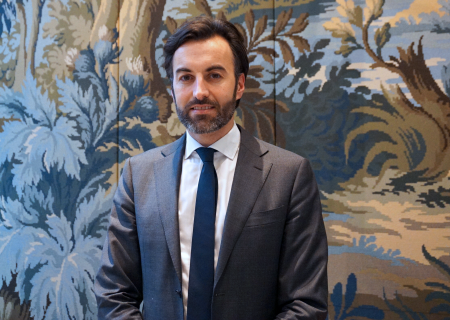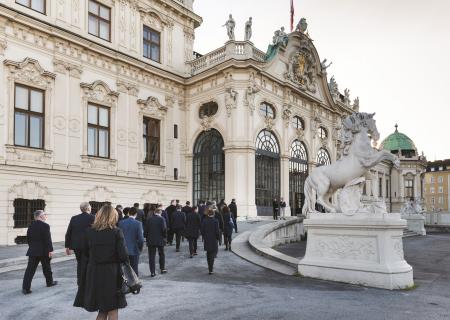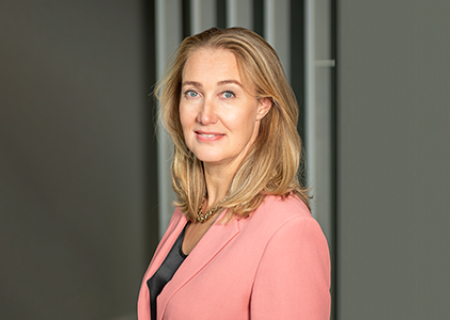Building tomorrow's industry, today
INREV Autumn Conference 2019, Rome
At the end of last year, INREV rounded off the century and its major event calendar with the INREV Autumn Conference which took place in Rome over two days between 20 and 21 November, welcoming 190 of the industry’s mid- to senior level players.
The diverse group of attendees gathered - old and new, with 60% attending the event for the first time. The group collectively representing 16 countries came together to network, discuss and listen to the various presentations in the programme built around the overarching theme of, ‘Building tomorrow’s industry, today’. The theme was a nod to the issues faced by the industry of the vastly changing and rapidly evolving non-listed landscape and the quest to seek future proof solutions to ride the waves of change. The programme also addressed pertinent sub topics such as Climate Risk, the multi-generational workplace and digitalisation.
Generals are only taught to fight the last war
Financial Times journalist, Gillian Tett took to the stage first in setting the scene and painted a picture of the economic climate in anticipation of the next global meltdown, having accurately predicted the GFC some twelve years previously. Rather on the contrary, Gillian proclaimed that the situation is not as dire as some are saying and that many lessons have been learned since the GFC to great effect, but we must not rest on our laurels.
 Using the age-old proverb, ‘Generals are only taught to fight the last war’ to illustrate how we must not face the new era of evolution and change using the methods from yesteryear, but rather update the solutions and tools we are using that match the new range of issues we face in today’s world. Gillian also alluded to straying away from the obsession with the inverted yield curve and that instead, the financial cycle is a more reliable indicator with its boom and bust points and considering the current climate, the current outlook is not that bad.
Using the age-old proverb, ‘Generals are only taught to fight the last war’ to illustrate how we must not face the new era of evolution and change using the methods from yesteryear, but rather update the solutions and tools we are using that match the new range of issues we face in today’s world. Gillian also alluded to straying away from the obsession with the inverted yield curve and that instead, the financial cycle is a more reliable indicator with its boom and bust points and considering the current climate, the current outlook is not that bad.
Gillian told how at the most, Europe is probably headed for a slowdown and the US should follow behind but to a lesser extent. But, she did warn how this prediction is of course not exempt from external shocks that cannot be anticipated, going to further suggest that the audience should always think outside of the box.
Think outside of the box
On a high from Gillian’s insightful and optimistic outlook, the audience then welcomed Kenneth Cukier, Senior Editor at the Economist to the stage for his presentation on embracing change and how to harness the culture of innovation in your organisations. Kenneth shared his thoughts perfectly by personifying real life global organisations into the three archetypes of innovation. Kenneth described the three main archeitypes as ‘Cassandra’, ‘The Jester’, and ‘Joda’, each having very different but very distinct traits – many being personality-based traits that he believed to be at the heart of the optimum environment for innovation to thrive.
Touching on the topic of climate change and resourceful investing, a panel took to the stage to discuss the full spectrum, beginning with guest speaker, Martin Norman from Greenpeace who reminded the audience of the dire situation of the climate, urging the industry to intervene and do its part. The panel then went on to share in-practice examples of what they are doing so far in terms of resourceful investing and strategies for a changing world. The entire panel told how they were all engaging in ESG strategies, such as embedding expert teams, using the GRESB tool for self-assessment and taking a wide view on the topic in the transition to net zero carbon. One panelist and member of the INREV ESG Committee shared that ‘Location, location, location’ is crucial in assessing the sustainability physical and transitional risk, favouring TCFD reporting – something which INREV is launching in the near future.

The rest of the afternoon was focused on generational changes and how this impacts our business and operations. We were joined by Dr. Paul Redmond of The University of Liverpool who gave a very lively presentation with a plethora of humorous anecdotes about the various generations that are in the workplace today. Paul shared that we are now very often working in a workplace with five different generations, (Silent Generation, Baby Boomers, Generation X, Generation Y and the Millennials) who all have their own unique ways, mannerisms, beliefs and experiences and understanding these and thinking carefully how to interact with these groups is important.
Following Paul, we welcomed our own industry cohort of millennials to the stage in a panel to discuss what they really think about the non-listed landscape. We were joined by Stoyan Zhelyazkov, Allianz Real Estate, Manuel Philippe Wormer, BVK and Olivia Muir, UBS. Discussing what they find most attractive about their career path, Olivia shared that the built environment and real estate’s ability to make an impact was a big plus point for her. All panelists agreed that the industry is a very social industry and very face to face which was also a positive factor.
When asked about what they value most in the workplace, Manuel told the audience how flexibility is a something which is highly sought after, with the other panelists agreeing with that and that their generation is expected to be reachable at all times but there is an extent to which this is possible, and that in turn, they should be able to have more flexibility in when they would like to work across the week. All panelists acknowledged that a good dialogue and meaningful channels of communication need to be established for this to work and is of course on a case by case basis.
Interested in reading more insights from the Autumn Conference? Head over to the Autumn Conference recap page for more detailed summaries of all presentations.
Save the date for the next INREV Autumn Conference which will be held on 19 November, 2020.







